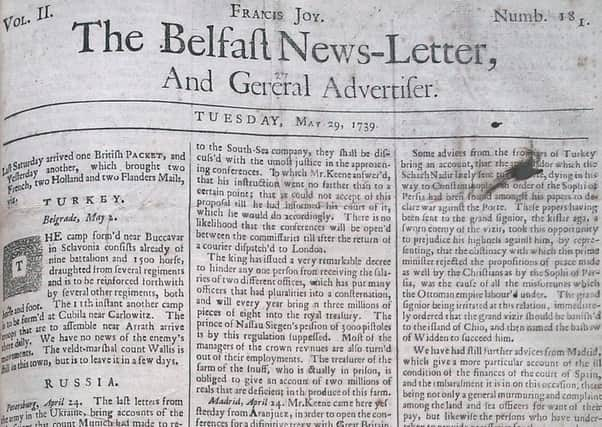Reported 280 Years Ago (June 9 1739): Scottish Presbyterian Assembly debates the dissenting ministers


SCOTLAND. EDINBURGH, May 17. Proceedings of the Venerable Assembly.
Afternoon the committee of the whole house met on the case of the seceding ministers; and at first it was proposed, that as every member present must have the same End in view, so it was most expedient to fall upon proper Means to attain that end; that rather than divide upon any question, both parties ought to make advances, so as any decision might pass with Unanimity, which alone could render the church formidable to her enemies.
Advertisement
Hide AdAdvertisement
Hide AdSeverals discoursed very learnedly on the dismal and hideous consequences of a libel for pains and penalties, and others on the different ideas of lenity; and tho’ several members positively declared, that as they never intended to stretch the libel, so they were confident it was not the intention of any one, to treat the seceders even with the severities they might be justly said to merit; yet others seem’d not to place over much confidence in these declarations, so that both parties, as if jealous of one another, thought of dealing at long weapons.
It was then argued, that the church ought to issue a seasonable Warning to all the faithful; that ministers ought to be vigilant, in exhorting their several flocks to guard against the seceders practices; and in the mean time endeavour to reclaim these brethren with hold and friendly conferences, that such amicable measures would rather conduce to a happy allaying the storm, than severities, since it was evident the seceders had reaped their greatest harvest from their being at all regarded by the church-judicatures; whereas had they been despised, they had languished, given it up, or died away; that as hitherto too many ministers had not had light enough, resolution, or even sincerity, to warn their audiences against the intrigues of the seceders, so the people were not yet ripe to receive the news of high censures being inflicted on them, they’d cry out, These poor Men suffer for Christ and his Cause! and if the libel should be defeated, O! the LORD has muzzled the Assembly, &c.
That these brethren had not seceded from the church rightly constitute, but the church from them, and our constitution also; and that a vote to the contrary (especially when carried by a narrow majority) however it might bear the air of authority, would neither convince or correct the judgment; that at this critical juncture it seem’d not expedient to widen the breach, and disperse congregations at home, when there might be a probability of wars abroad; that nevertheless they were not for intirely dropping the libel, on the contrary, for doing something on it, and remitting the executive part to the commission, or the whole to the prudence of next assembly.
It answered, that all warnings and monitories hitherto used to reclaim these brethren had proved lost labour, as must any future attempts be that way. No! they would not lose their vain-glorious popularity, &c. for the world. That tho’ the church had used lenity so far as to compliment the first seceding ministers with their authority, in reponing them, after they had been had been deposed, even without any application on their part, yet what return? why, they calumniated, condemned, and declared war against her; that even since last assembly they had marshalled their deluded followers into little armies, marching them when and where they would, even to the gates of this city; laying their hearers under obligations never to entertain any communication with the ministers of the established church: that lenity to particulars was often a cruelty to society, that if they were not now at the bar, they’d sure still decline the church’s authority; but who was to be judge? They or the church to which they had swore obedience and subordination? Sure they would not call in the Pope or the archbishop of Canterbury.
Advertisement
Hide AdAdvertisement
Hide AdThat their perverse and stiff-necked practices were in a great measure owing to the great opinion they had of many friends within the walls of this house; and it were to be wished that these last would honestly take off the mask and declare themselves; one hidden enemy being more dangerous than the whole associate presbytery.
Finally, that as the very constitution and being of the church, the peace of society and welfare of religion were at stake, it was an indispensable duty on the church to bestir herself, and in so doing they might expect the hand of the Most High would defeat all the fatal consequences some ministers had mustered up, and which as yet seem’d only a bugbear.
After debates about the state of the vote, the following was put, Proceed upon the libel against the seceding ministers, or not? And it carried Proceed by a narrow majority,
This Sederunt lasted near 6 hours.
[A Church of Scotland minister Ebenezer Erskine had defended a book, The Marrow of Modern Divinity, and was suspended from ministry in 1733 over a sermon he preached. He and his supporters constituted themselves as a separate church, but refused to appear before this 1739 general assembly and were removed by the Presbyterian church in 1740]